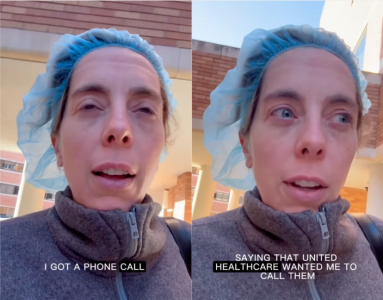Doctor exposes how an insurance giant questions life-saving procedures
By
Aubrey Razon
- Replies 1
In critical health moments, we expect our healthcare system to work seamlessly. But a shocking incident with a Texas doctor and UnitedHealthcare has revealed troubling practices that could affect anyone—especially as we age.
Could these issues directly impact your health and well-being?
Dr. Elisabeth Potter, a plastic surgeon specializing in breast reconstruction, was in the midst of performing a critical bilateral DIEP flap surgery—a complex procedure following a mastectomy—when she received an unexpected interruption.
UnitedHealthcare, the patient's insurance provider, called to question the necessity of the surgery, despite the patient already being under anesthesia and the procedure having been pre-approved.

Dr. Potter's frustration was palpable as she recounted having to pause the surgery to address the insurer's inquiries, only to find that the representative lacked access to the patient's full medical records.
This incident highlights concerns beyond administrative delays; it raises questions about the potential risks when decisions about patient care are made by individuals not directly involved in the treatment process.
The timing of this incident is particularly poignant, as it follows the tragic death of UnitedHealthcare's CEO, Brian Thompson, which has sparked intense debate over the practices of health insurance companies.
The scrutiny is not unwarranted, as UnitedHealthcare faces a lawsuit alleging the denial of necessary care to patients under Medicare Advantage plans, reportedly using an AI model with a high error rate.
This case reflects a broader issue in healthcare, where insurance companies significantly influence the treatments patients receive.
These decisions can lead to delays or denials in care, potentially resulting in poorer health outcomes or avoidable complications.
Experts from both the financial and healthcare sectors have weighed in on the incident.
Michael Ryan, a finance expert, describes insurance companies' tactics as an “attrition strategy,” where administrative hurdles are intentionally placed to protect profits.
“The math is simple but troubling: if even 30% of patients give up on pursuing care due to delays and denials, that translates to hundreds of millions in preserved capital for the insurer,” Ryan explained.
Alex Beene, a financial literacy instructor, emphasizes the strain on public relations due to such practices, highlighting the need for transparency and understanding in the claims process.
“No one expected businesses like UnitedHealthcare to completely change overnight, but there does need to be a better understanding of the policies and procedures that go into accepting or denying a claim. If all that's known is that the claim is denied and transparency continues to be elusive, it's going to bring more resentment to an industry that can't afford much more,” Beene added.
Veer Gidwaney, CEO of Ansel Health, points out that while managing costs is a common justification for these actions, it should never compromise patient safety.
Source: @drelisabethpotter/Instagram.
The outcry following Dr. Potter's experience is a symptom of a larger, systemic problem.
Financial structures in the health insurance industry could benefit from adjustments, including regulatory measures to address delays in care approvals.
Ensuring timely treatment is critical for better health outcomes. As a society, fostering a healthcare system that prioritizes patient well-being is essential.
 Have you or a loved one faced similar challenges with health insurance providers? How do you navigate the complexities of the healthcare system to ensure you receive the care you need? Share your experiences and insights in the comments below.
Have you or a loved one faced similar challenges with health insurance providers? How do you navigate the complexities of the healthcare system to ensure you receive the care you need? Share your experiences and insights in the comments below.
Could these issues directly impact your health and well-being?
Dr. Elisabeth Potter, a plastic surgeon specializing in breast reconstruction, was in the midst of performing a critical bilateral DIEP flap surgery—a complex procedure following a mastectomy—when she received an unexpected interruption.
UnitedHealthcare, the patient's insurance provider, called to question the necessity of the surgery, despite the patient already being under anesthesia and the procedure having been pre-approved.

The incident highlights systemic issues in health insurance, suggesting a need for reforms to better align financial practices with patient care priorities. Image source: @drelisabethpotter/Instagram.
Dr. Potter's frustration was palpable as she recounted having to pause the surgery to address the insurer's inquiries, only to find that the representative lacked access to the patient's full medical records.
This incident highlights concerns beyond administrative delays; it raises questions about the potential risks when decisions about patient care are made by individuals not directly involved in the treatment process.
The timing of this incident is particularly poignant, as it follows the tragic death of UnitedHealthcare's CEO, Brian Thompson, which has sparked intense debate over the practices of health insurance companies.
The scrutiny is not unwarranted, as UnitedHealthcare faces a lawsuit alleging the denial of necessary care to patients under Medicare Advantage plans, reportedly using an AI model with a high error rate.
This case reflects a broader issue in healthcare, where insurance companies significantly influence the treatments patients receive.
These decisions can lead to delays or denials in care, potentially resulting in poorer health outcomes or avoidable complications.
Experts from both the financial and healthcare sectors have weighed in on the incident.
Michael Ryan, a finance expert, describes insurance companies' tactics as an “attrition strategy,” where administrative hurdles are intentionally placed to protect profits.
“The math is simple but troubling: if even 30% of patients give up on pursuing care due to delays and denials, that translates to hundreds of millions in preserved capital for the insurer,” Ryan explained.
Alex Beene, a financial literacy instructor, emphasizes the strain on public relations due to such practices, highlighting the need for transparency and understanding in the claims process.
“No one expected businesses like UnitedHealthcare to completely change overnight, but there does need to be a better understanding of the policies and procedures that go into accepting or denying a claim. If all that's known is that the claim is denied and transparency continues to be elusive, it's going to bring more resentment to an industry that can't afford much more,” Beene added.
Veer Gidwaney, CEO of Ansel Health, points out that while managing costs is a common justification for these actions, it should never compromise patient safety.
Source: @drelisabethpotter/Instagram.
The outcry following Dr. Potter's experience is a symptom of a larger, systemic problem.
Financial structures in the health insurance industry could benefit from adjustments, including regulatory measures to address delays in care approvals.
Ensuring timely treatment is critical for better health outcomes. As a society, fostering a healthcare system that prioritizes patient well-being is essential.
Key Takeaways
- Dr. Elisabeth Potter, an Austin-based plastic surgeon, was interrupted during a cancer patient's surgery by UnitedHealthcare to verify the necessity of the procedure.
- UnitedHealthcare faces criticism and a lawsuit for denying care under Medicare Advantage, with allegations of utilizing an AI system prone to errors.
- Medical professionals and industry experts express concerns that administrative requirements by insurance companies may prioritize cost management over patient care, potentially impacting treatment outcomes.
- The incident reflects broader issues within the health insurance industry, indicating a need for regulatory reform to align financial incentives with patient well-being.






